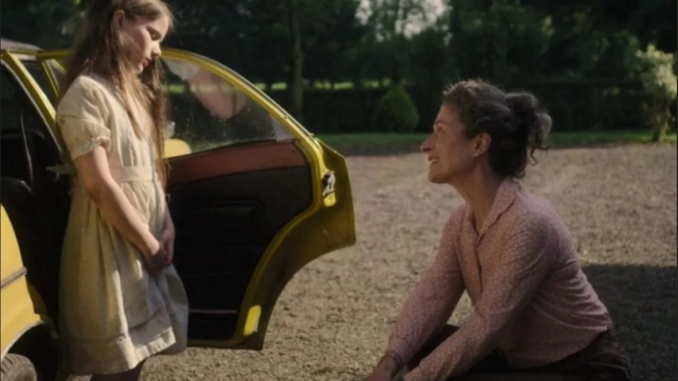

An exquisite little masterpiece – the words of my dear friend aptly describe this Irish language film adapted and translated from Claire Keegan’s acclaimed short story ’Foster’. It is a deeply affecting and authentic marking of life in rural Ireland in the 1980s. And much more. There are no pastiches or caricatures here and neither any trace of self-pity.
The story unfolds seamlessly as witnessed by a nine year old girl looking out at the adult world as she accepts her place and her destiny within the bonds of family and kin. She is one sunny day dispatched from her chaotic home to live for a time, a long rich summer, with relatives. The subtlety of the cinematography quietly and slowly spans the landscape and sets and maintains a tone that allows us to absorb a quality of feeling in the inner and outer lives of people, their relations to each other and to the land. The child at the centre is in between two households, two contrasting rhythms of life, her birth family, whose people are overwhelmed by the teeming relentlessness and fertility of nature, their own, and the land they carelessly tend. And the other tender household, where she spends her summer, more rooted, more attentive, more attuned and quietly deeply grieving for life lost.
It is a story particularly pertinent to Irish culture and all rural cultures where fosterage had been embedded between families in farming communities. But the story touches something more universal about the child within us all. It is a story we all know in parts.
This is a film is crafted with patience and the lightest of touch, with enough space for the child on the screen and the child in us all to be honoured as her story is honoured. It unfolds as a poetic narrative, the epiphanal moment at the centre when the child is liberated into childhood is perfectly mirrored at the ending.
There is here a subtle, authentic and tender regard to something essentially Irish, essentially human and what it is to live through change and loss, not least the loss of kinship and community.
A sensitive, intelligent regard for the Irish language has long run counter to the crude attempts at its ‘re-establishment’ initiated and envisaged from the time of Irish independence. The fallout of such harsh mishandling did much to further a sense of alienation and dislocation from the mother tongue which has resonated through the years. There is a current fresh attentiveness to the indigenous language, bubbling from ‘the bottom up’, from the ground, a heartbeat or drum beat is taking place here and there. This is more than an act of reclamation, something organic is shifting and is impacting creative work across the arts.
An Cailín Cúin is such an example. This is a low budget debut film from the young director Colm Bairéad. It is crafted organically within the context of a living Irish language community. It takes its place among the canon of Irish language films and remarkably is the first Irish language film to win Irish film and television awards, European film awards and nominations for Baftas and Oscars. The language is integral to the setting but not in any way in the foreground. In terms of a new regard for the place of the Irish language this feels radical.
Marian Killick
Available on Amazon video, Apple TV, BFI Player, Curzon Player
On general release in cinemas from May 2022.
Curzon Cinemas.